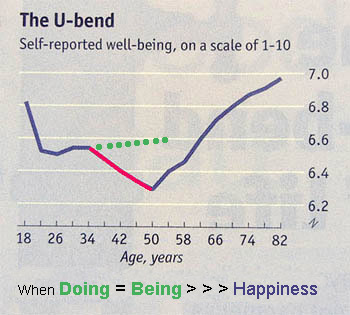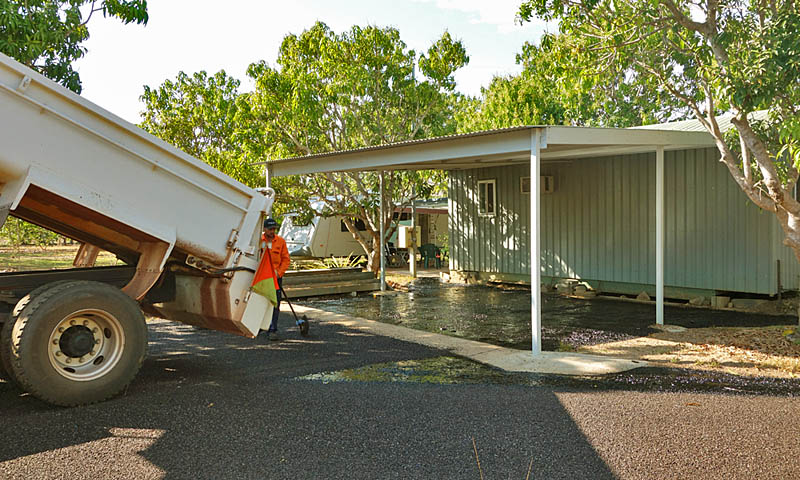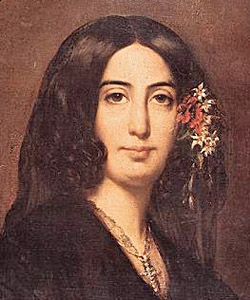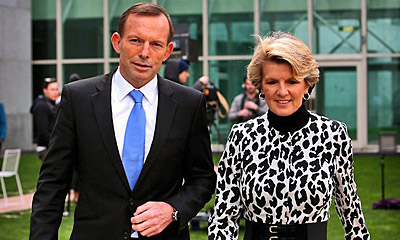Biographical Log of Michael Furstner - Page 304
12 | 13 ||
2014 :
Jan |
Feb |
Mar |
Apr |
May |
Jun |
Jul |
Aug |
Sep |
Oct |
Nov |
Dec || Page :
Previous |
Next
Martinshof Story -
Happiness -
Awareness -
Black Forest walks -
Camino -
Dolmen Tour -
Travel
Most Recent -
Next -
Previous -
Page 1 -
Photos -
Maps & Articles -
MP3s -
Jazclass
Tuesday 1 - Thursday 10 July, 2014
(diary)
 Some weeks ago I had an interesting email exchange
with Ton, a fellow Dutchman, now living with
his Polish partner in Poland.
Some weeks ago I had an interesting email exchange
with Ton, a fellow Dutchman, now living with
his Polish partner in Poland.
Ton, who has his
own Business Consulting and Coaching company, tells
me that his main aim is to convert his clients'
approach from "Doing" into
"Being".
This in a nutshell you might say
is the very purpose of each individual
life.
We should aim to express ourselves in the world and
this of course should extend to the work we do or
the business we are engaged in.
The sharp down-turn in our sense of well-being
(as shown in red on The Economist's graph here),
surely (more often than not) is a reflection of our unhappiness with the
work we have to do in order to financially support
ourselves and our family.
Ton's work clearly aims to turn this negative
experience around into a positive one (shown by the
green dotted line) through changing the focus, style and
attitude of a company's management and
employees.
This philosophy is undoubtedly more naturally and
easily expressed by the smaller family businesses.
My own parents' business (Martinshof) was a good example.
During the couple of years I ran the business after
my father's sudden death, I learned more about who
he really was than during the 20 years I lived with
him while growing up. Our employees too were
allowed to fulfill their task in their own way,
reflecting their individuality, which made for a
happy company, and in fact felt like a happy
"family".
I still get together with our former long term employees every
time I visit Holland. This year will have our reunion in late August.
Most Recent -
Next -
Previous -
Page 1 -
Photos -
Maps & Articles -
MP3s -
Jazclass
Friday 11 - Sunday 20 July, 2014
(diary)
 The access road on our property as well as the carport against
the back of my cabin have been sealed now, so no more dust in
the dry season when we drive on it.
The access road on our property as well as the carport against
the back of my cabin have been sealed now, so no more dust in
the dry season when we drive on it.
I downloaded an interesting book recently by John Carey
: The Intellectuals and the
Masses. It deals with the response of the English
literary intelligentsia to the new phenomenon of mass culture
between 1880 and 1939.
Prior to this period the world had been divided by a great gulf
separating the readers from the non-readers.
But with the establishment of the English Education act of
1871 this changed dramatically : a huge literate reading
public came into being which (as Publishers quickly found out)
preferred to read material like Treasure
Island and Dr.Jekyll and
Mr.Hyde, rather than novels by George Elliot or the
"excessively literary" Bernard Shaw.
 There were strong reactions by the artistic intelligentsia to
this, one of which was the urgent need to distantiate
themselves from these masses by creating art that only
their former audience, the more affluent individuals
would appreciate and could understand.
There were strong reactions by the artistic intelligentsia to
this, one of which was the urgent need to distantiate
themselves from these masses by creating art that only
their former audience, the more affluent individuals
would appreciate and could understand.
This (in my personal view) throws a totally new
perspective on the early 20th century period of
massive artistic "renewal" in all forms of art : literature,
music, painting, architecture.
Art in general, by this point in time, had come to the end of
the road they had been traveling on for centuries.
So it
would be misleading to point to the above as the main reason
for their change of tack.
But the need to differentiate (and distance) themselves
from the masses must (I believe) have been a significant
catalyst for many artists to forge ahead into new directions.
However there is amongst many artists of that period also a romantic
appreciation for segments of these masses, such as the
farmers and workers living on the land.
George Sand
for example, in her novel The Haunted Pool
admires the farmer tilling the land while she watches him, but
at the same time laments what a pity it is that he is not
able to fully appreciate the nature setting he lives in
like she does.
Most Recent -
Next -
Previous -
Page 1 -
Photos -
Maps & Articles -
MP3s -
Jazclass
Monday 21 - Thursday 31 July, 2014
(diary)
 Most Australians have disliked and/or underestimated these two politicians for
many years, and not just from the left side of politics.
Most Australians have disliked and/or underestimated these two politicians for
many years, and not just from the left side of politics.
But (as you may have perceived from some of my Blog entries) I
have been a strong favourite of Tony Abbott, ever since he emerged
as a Minister in the Howard Government, more then 10 years ago.
Julie Bishop too caught my attention during her period as
Opposition Foreign Ministry spokes person.
Frankly speaking it
often requires quality to recognise quality!
In the face of perceived weakness both from the USA and Europe
to stand up to Vladimir Putin, Australia has taken the lead
showing a strong stand against him and rallying other countries to
stand up and be counted.
Now the firm leadership of Australia's Prime Minister Tony
Abbott (concerning the shot down Malaysian passenger airline)
and the relentless efforts of Foreign Minister Julie Bishop
are receiving high praise and accolades from leaders around the
world, especially from Europe and the USA (from both sides of
politics).
As a result of their present efforts, as
well as their accumulated efforts during the past 9 months in International Trade
negotiations (ably carried out by Trades Minister Andrew
Rob) and the Abbott Government's decisive action against
illegal immigrants traveling by boat, the esteem in which Australia is held amongst world leaders
has risen to a level where it has never been
before !
It reveals the quality of this present Government, when it is
freed from the shackles of the self serving, incompetent jokers
(Labour, Greens, etc.) who oppose and block every sensible national policy
move in the Senate.
In stark contrast the Nations in Europe have largely lost respect
from the outside world because of their weakness and abject
failure to confront Putin in his Hitleresque land grabs of
Russian speaking populated regions (the Crimea and Eastern Ukraine)
Russia lost after the demise of the former Soviet Union.
What the former Russia could not accomplish with military power (I
read in and agree with The Australian newspaper), Putin is
achieving effortlessly with economic power : control over Europe!
 Some weeks ago I had an interesting email exchange
with Ton, a fellow Dutchman, now living with
his Polish partner in Poland.
Some weeks ago I had an interesting email exchange
with Ton, a fellow Dutchman, now living with
his Polish partner in Poland. 
 There were strong reactions by the artistic intelligentsia to
this, one of which was the urgent need to distantiate
themselves from these masses by creating art that only
their former audience, the more affluent individuals
would appreciate and could understand.
There were strong reactions by the artistic intelligentsia to
this, one of which was the urgent need to distantiate
themselves from these masses by creating art that only
their former audience, the more affluent individuals
would appreciate and could understand. Most Australians have disliked and/or underestimated these two politicians for
many years, and not just from the left side of politics.
Most Australians have disliked and/or underestimated these two politicians for
many years, and not just from the left side of politics.